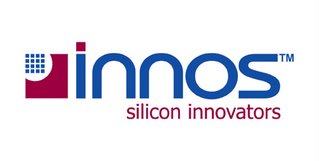 Innos, the UK’s leading research and development company for innovations in nanoscale technology, today publishes its year-end review, detailing milestone achievements in commercial and academic sectors during 2006.
Innos, the UK’s leading research and development company for innovations in nanoscale technology, today publishes its year-end review, detailing milestone achievements in commercial and academic sectors during 2006.In January 2006, just two months after moving its processing capabilities to the state-of-the-art 2650m², class 100-10,000, MiPlaza R&D industrial research facility in the Netherlands, Innos announced that it had completed its first fabrication process at the site. Working with the Nanoscale Systems Integration Group (NSI), the Supergen consortium EPSRC funded project was able to demonstrate how to accurately pattern layers of resist using e-beam direct write, with accuracies of a few tens of nanometres.
Later in January Innos published results from collaborative research between the universities of Surrey, Southampton and the Politecnico di Bari in Italy. Again funded by the EPSRC as well as Bookham Technology Plc and UniSdirect the project developed a novel method for coupling light from an optical fibre to 200nm thick silicon waveguides in optical communications. Innos completed the fabrication process that demonstrated the highest recorded coupling efficiency of 55%.
Business Development Director at Innos, Alec Reader comments on its relationship with MiPlaza and work undertaken at the cleanroom, “It is testament to the teamwork of all at Innos and MiPlaza that we could seamlessly transfer our activities to MiPlaza so rapidly. Today our clients benefit from the most comprehensive tool-set and processing expertise required for applying nanomaterials to silicon-based devices.”
In March the first of two lithography-based patents for 2007 were filed, enabling Innos to exclusively offer businesses the opportunity to capitalise on the RF CMOS market, with a viable alternative to the long cycle times and high costs commonly associated with integrated circuit (IC) prototyping, by taking advantage the worlds most powerful electron-beam lithography capabilities. This was followed in the Summer by the launch of Innos’ Rapid Prototyping Service.
Reader explains the significance of the launch for the UK design community, “Typically new ICs are developed from original circuit designs and developing these into working products requires a number of iterative manufacture steps. Should the prototype fail it will be followed by an investigation to identify the reason for failure. This ultimately leads to an improved design and the requirement for the manufacture of further prototypes, but it takes time and time costs money.”
The Rapid Prototyping Service slashes the proof-of-concept design and testing timescales for wireless technology from an average of 18 months to fewer than two months, supporting faster turnaround and time to market. This new service was complimented by the appointment of former DTI Manufacturing Consultant, David Guite. As Senior Yield and Transfer Engineer, he is benefiting Innos’ clients with over 25 years experience in progressing commercial projects from the R&D phase to high quality, high yield and highly profitable volume manufacturing.
Innos prototyping skills were recognised when it was chosen to provide integration engineering support and prototyping services for the EU funded UK Framework 6 Network of Excellence SiNANO project. The underlying principle of the project is to explore different technology routes and achieve very high speed, silicon-based nanoscale devices, which can be adopted in the future engineering of ICs.
In July Innos was given its first accolade. Voted for by industry peers across Europe, Asia and the USA, the ‘R&D Initiative of the Year 2006’ was presented at the EuroAsia Semiconductor Industry Awards at Semicon West in San Francisco, in recognition for its involvement in a joint venture with the University of Southampton’s School of Electronics and Computer Science (ECS) for the development of a silicon MEMS (Micro Electrical Mechanical Systems) Microgenerator for Perpetuum Ltd.
In addition to growth in the commercial sector, Innos has continued its commitment to nurturing academic achievement, as Reader explains, “This year we have supported academic researchers from institutions across the UK, with fabrication and consultancy services that have assisted them in formulating a proof of concept in order to strengthen full grant proposals from the EPSRC.”
Completing a busy year Innos moved to its new Southampton headquarters at the Millbrook Technology Campus. Commenting on the year ahead Reader states, “Innos is constantly evolving, keeping pace with the rate of design and innovation. We will continue to provide the UK commercial and academic sectors with knowledge, expertise and facilities.”
For further information, interviews and images, please contact innospr@mccint.com

No comments:
Post a Comment